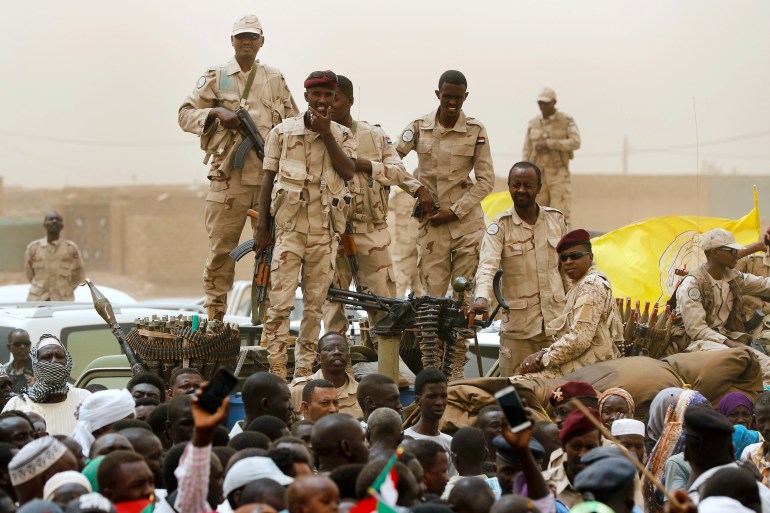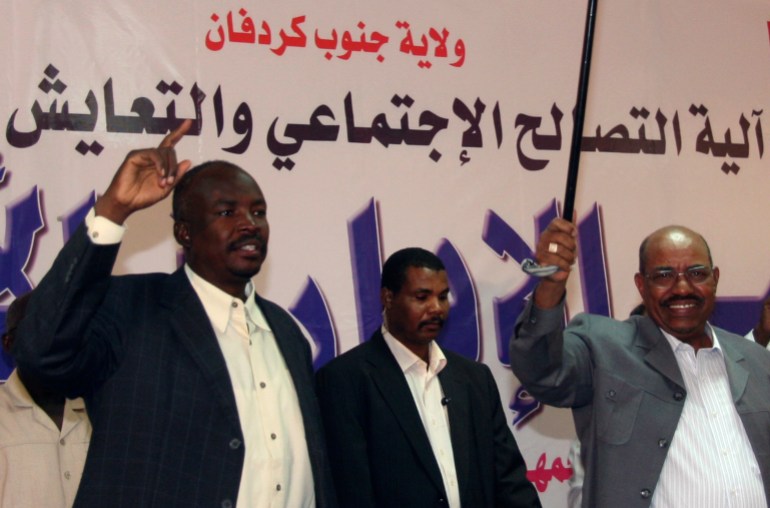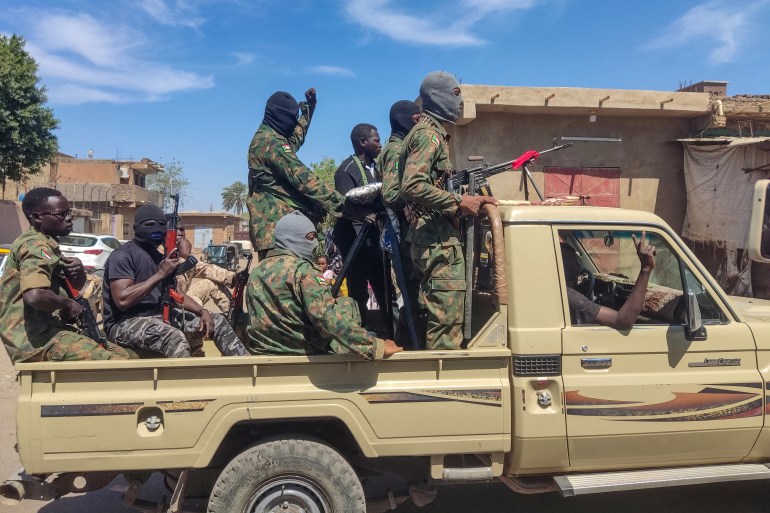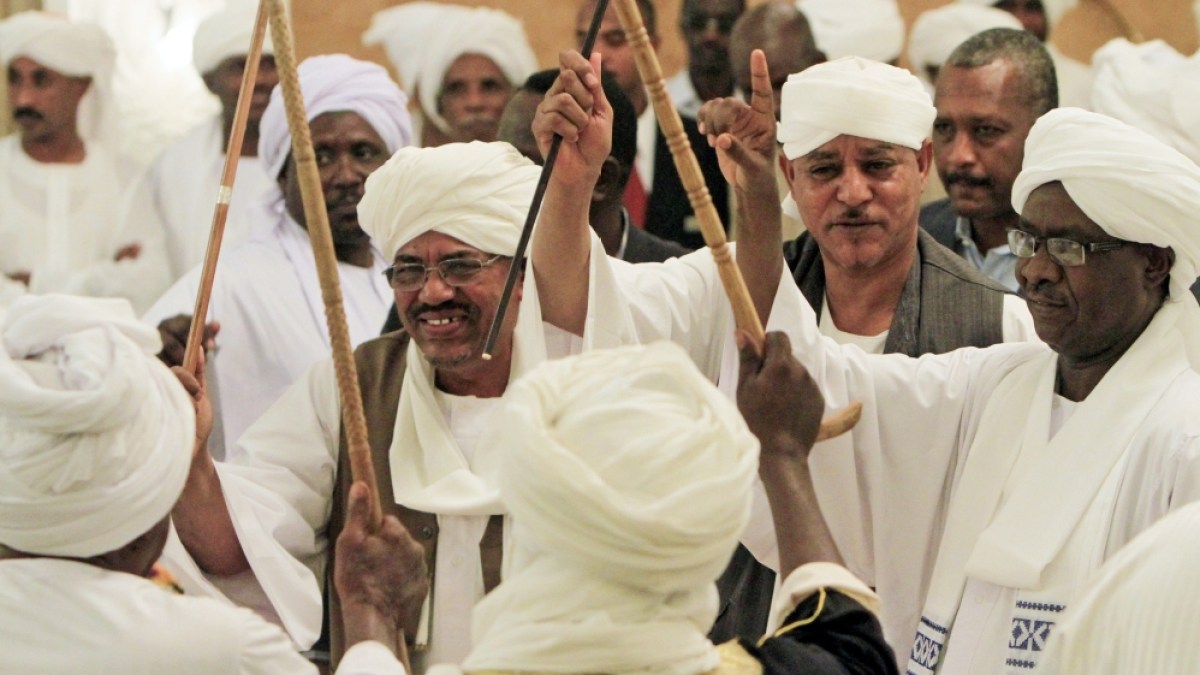In a new twist in Sudan’s civil war, a notorious tribal chief has re-emerged from obscurity to support the army.
Named Musa Hilal, he is the original leader of the nomadic (also referred to as “Arab”) tribal militias, known as the Janjaweed, responsible for atrocities during the Darfur War that started in 2003.
In that war, Hilal fought alongside Mohamed Hamdan “Hemedti” Dagalo as part of the Sudanese government’s war on sedentary farming tribes (referred to as “non-Arab” tribes) that had rebelled against the state. More than 300,000 people were killed due to armed conflict as well as disease and famine brought on by the war, according to the United Nations.
More than two decades later, Hemedti finds himself embroiled in another conflict, heading the paramilitary Rapid Support Forces (RSF) – which grew out of the Janjaweed – in an existential fight against the Sudanese Armed Forces (SAF).
Last week, Hilal broke his silence on the now year-long conflict, telling his supporters that he “stands with the army”, and adding that he had been asked by local tribes to “prioritise state stability and peace”.
He was also reported to have criticised the RSF for actions the force is accused of committing, such as rape and looting.
Hilal and Hemedti are both from the nomadic Rizeigat tribe, but Hilal is also a respected tribal leader within the subtribe Mahamid branch, giving him some local status over Hemedti.
Most nomadic tribes in Darfur have thrown their support behind the RSF, lending recruits, local knowledge and access to vital supply lines.

But given Hilal’s status, his announcement could undercut Hemedti’s support base, and risk triggering infighting between nomadic tribes, according to experts and sources close to his clan.
Some believe that Hilal’s move could be an attempt to regain political relevance in Darfur.
“Hilal doesn’t have a lot of supporters [compared to Hemedti] right now, but he can collect a lot,” said Samya Hendosa, a member of the Mahamid clan with relatives close to Hilal and Hemedti, and herself a relative of Hemedti, despite her fierce criticism of the RSF.
“What’s clear is that the army and Hilal reached an agreement where Hilal [and his supporters] will receive a certain amount of money, materials and weapons,” she added.
Friend or foe?
In 2003, the army outsourced a counterinsurgency to Hilal and his followers.
They were paid and armed to fight “non-Arab” armed groups who were revolting against the government’s marginalisation of their tribes and region.
Hilal’s forces committed summary executions, burned entire villages to the ground and used rape as a weapon of war, according to Human Rights Watch. His tribal militias became known colloquially as the “Janjaweed”, which means “devils on horseback” in Sudanese Arabic.
As a reward for crushing the insurgency, Sudan’s autocratic former President Omar al-Bashir appointed Hilal as his special adviser in 2008. But Hilal grew disillusioned with al-Bashir and believed that he was not interested in rewarding him for crushing a rebellion or developing Darfur, so he left Khartoum angry and returned to Darfur five years later.
In 2014, Hilal formed his own armed movement, the Revolutionary Awakening Council, which al-Bashir saw as a threat to his rule. The ex-president countered by appointing Hemedti as leader of the RSF, which was later tasked with disarming and arresting Hilal and his sons in 2017.
“Hilal’s project was to unify the Darfur tribes against Khartoum, and al-Bashir sensed that this could turn into something big against him. That’s why he immediately tried to divide [the Arab tribes] by sending the RSF after him,” said Suliman Baldo, the founder of the Sudan Transparency and Policy Tracker, a think-tank covering political affairs in the country.

Months after the army and RSF upended Sudan’s frail democratic transition in October 2021, they released Hilal. He kept a low profile, even after SAF leader Abdel Fattah al-Burhan and Hemedti turned on each other to ignite Sudan’s civil war in April of last year.
But in February of this year, having kept a low profile since the start of the war, Hilal allegedly promised Hemedti that he would remain neutral in exchange for the equivalent of $750,000, said Baldo, as well as local journalists and sources from within the Rizeigat tribe and RSF who did not wish to be named.
“At the tribal level, there was a kind of reconciliation. But now we have this video,” Baldo told Al Jazeera, referring to footage showing Hilal pledging his support for the army.
Divide and conquer
In the weeks leading up to Sudan’s civil war, activists said that military intelligence tried to recruit Rizeigat fighters into a new militia to undercut Hemedti’s tribal base, which he relies on for fighters and logistical support.
Hendosa believes that military intelligence is doubling down on its divide-and-conquer tactics through co-opting Hilal. She said that Hilal has former ties to prominent members of Sudan’s political Islamic movement, which are collectively known as the Kizan.
The Kizan ruled under al-Bashir for three decades and are speculated to have a number of senior officers in the security forces, including in military intelligence.
“The plan of the Islamic movement in Sudan is to divide the Arab tribes. That’s the goal,” Hendosa told Al Jazeera.
“It is in the interest of military intelligence to split the Arabs of Darfur and to find ways to get them to fight each other. This is consistent [historically] with the strategy of military intelligence,” added Baldo.

Hilal’s announcement has already generated divisions and backlash among Rizeigat tribe leaders. In a video uploaded and then deleted from Facebook, a Mahamid chief said that Hilal did not represent his clan’s position and that the Mahamid in West Darfur were firmly behind the RSF.
“The RSF is interested in bringing freedom, justice and fairness [to us all],” the Mahamid tribal leader said. “The army is also a criminal, a butcher and a killer….and in the past] it used all of its violence against us.”
Security assurances
Earlier this month, several non-Arab armed movements declared war on the RSF after relinquishing their neutrality in North Darfur.
The RSF and aligned militias responded by burning down at least 15 mostly non-Arab villages west of el-Fasher, according to the Darfur Network for Human Rights. The army has also indiscriminately bombed ostensible RSF positions, killing dozens of civilians.
The mounting violence has sparked fears that an all-out tribal conflict could erupt in North Darfur. The tense situation may have compelled Hilal to side with the army to protect his tribal supporters from ethnically motivated attacks, according to Ahmad Gouja, a local journalist from Darfur.
“I think he’s trying to protect his Mahamid tribe from possible tribal clashes … now that he’s on the same side as the non-Arab armed movements it will restore some calm and balance,” Gouja told Al Jazeera.
Mohamed Fateh el-Yousif, the founder of the local outlet Darfur 24, agrees, but he believes that Hilal is also trying to stop the army’s indiscriminate bombing of his community.
“He took this position to ally with the army, so that the bombs from the warplanes would stop hitting his area,” he told Al Jazeera.
Baldo also believes that Hilal’s decision was predictable, arguing that he would have never accepted to play second fiddle to Hemedti.
“Hilal is seen as someone who is more senior and legitimate as a tribal chief and Hemedti doesn’t claim to be a tribal chief on any level,” he told Al Jazeera. “In that category, Hilal is far above Hemedti, so he would never join the RSF.”


